2(2 dbl. pic.).2.2.1/2.2.2.0/cel./hp./4 perc. strings
World premiere by the Illinois Philharmonic Orchestra, Stilian Kirov, conductor; Anima – Glen Ellyn Children’s Chorus, Evan Bruno, artistic director, William Buhr, accompanist; and The Chicago High School for the Arts, Charles Taylor, music director, Andrew Lawrence, accompanist, 16 March 2024.
Duration: 30 minutes
Co-commissioned by Anima – Glen Ellyn Children’s Chorus and the Illinois Philharmonic Orchestra.
Treble Chorus can be comprised of a mix of adult sopranos, mezzo-sopranos, altos, with youth girl and boy sopranos, mezzo-sopranos, and altos.
This commission and associated activities are partially supported by a 2019 grant from the Illinois Arts Council Agency and Illinois Humanities.
Informal reference recording is available for private listening. If you would like to review the recording please Contact Augusta Read Thomas.

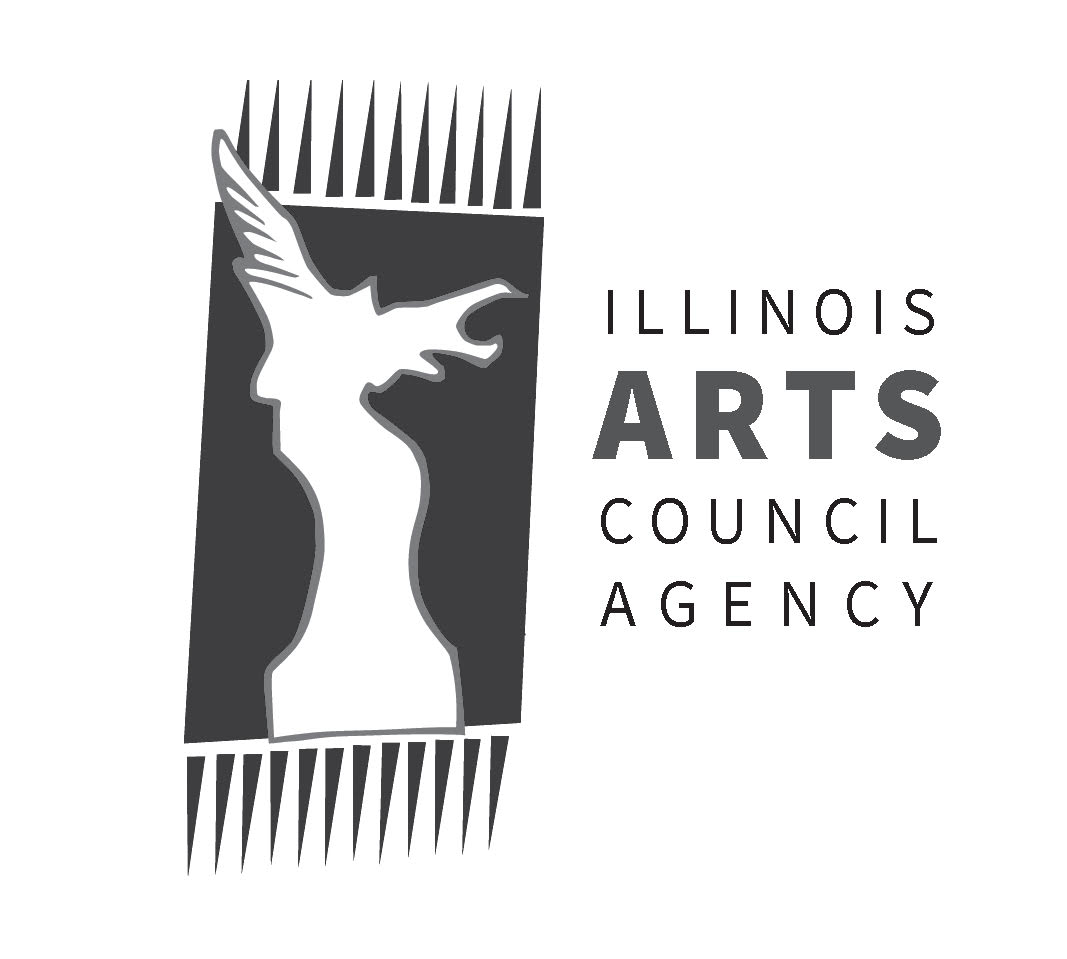
"BRONZEVILLE GIRLS AND BOYS”
Reprinted By Consent of Brooks Permissions.
I shall create! [1]
Each body has its art...[2]
Tommy
I put a seed into the ground
And said, “I’ll watch it grow.”
I watered it and cared for it
As well as I could know.
One day I walked in my back yard,
And oh, what did I see!
My seed had popped itself right out,
Without consulting me.
Live in the along. [3]:
To be in love
Is to touch things with a lighter hand. [4]:
Cynthia in
The Snow
It SUSHES.
It hushes
The loudness in the road.
It flitter-twitters,
And laughs away from me.
It laughs a lovely whiteness,
And whitely whirs away,
To be
Some otherwhere,
Still white as milk or shirts.
So beautiful it hurts.
If you wanted a poem you only need to look out of a window. [5]:
Poetry is life distilled. [6]:
If you wanted a poem you only need to look out of a window. Reprise [7]:
Live in the along. Reprise
Your sky may burn with light,
While mine,
Spreads beautiful to darkness. [8]:
Robert, Who is Often
a Stranger to Himself
Do you ever look in the looking-glass
And see a stranger there?
A child you know and do not know,
Wearing what you wear?
Exhaust the little moment. Soon it dies.
And be it gash or gold it will not come
Again [9]:
From De Koven
I’d keep you with me always.
You’d shine both night and day.
Mexie and Bridie
A tiny tea-party
Is happening today.
Pink cakes, and nuts and bon-bons on
A tiny, shiny tray.
It’s out within the weather,
Beneath the clouds and sun.
And pausing ants have peeked upon,
As birds and God have done.
Mexie’s in her white dress,
And Bridie’s in her brown.
There are no finer Ladies
Tea-ing in the town.
Live in the along. reprise
We are each other's magnitude and bond. [10]:
From De Koven
Ah
night and day
Marie Lucille
That clock is ticking
Me away!
The me that only
Yesterday
Ate peanuts, jam and
Licorice
Is gone already.
And this is
‘Cause nothing’s putting
Back, each day,
The me that clock is
Ticking away.
The Admiration
of Willie
Grown folks are wise
About tying ties
And baking cakes
And chasing aches,
Building walls
And finding balls
And making planes
And cars and trains –
And kissing children into bed
After their prayers are said.
From De Koven
Ah
Shine Star Shine!
Reprinted By Consent of Brooks Permissions.
1. Boy Breaking GlassMusic for me is an embrace of the world, a way to open myself to being alive in the world – in my body, in my sounds, and in my mind. I care deeply about musicality, imagination, craft, clarity, dimensionality, an elegant balance between material and form, and empathy with the performing musicians as well as everyone who works in the presenting organizations.
Gwendolyn Brooks Settings was composed between 2018 and 2020. Collaborating with the Illinois Philharmonic Orchestra, Stilian Kirov, conductor; Anima – Glen Ellyn Children’s Chorus, Evan Bruno, artistic director, William Buhr, accompanist; and The Chicago High School for the Arts, Charles Taylor, music director, Andrew Lawrence, accompanist, has been an exhilarating experience. I am grateful to the many extraordinary colleagues who have made this partnership possible. The magnificence and energy of massed vocal and orchestral resources is humbling, inspiring, and exemplifies teamwork.
I am deeply thankful to Cedille Records, James Ginsburg, president, Bill Maylone recording engineer, and to the whole Cedille Records team for recording Gwendolyn Brooks Settings for release.
In 2018, Dr. Charles Sundquist, the former artistic director, Anima – Glen Ellyn Children’s Chorus, generously proposed to me the idea of my making a large-scale composition for chorus and orchestra which would set texts from Gwendolyn Brooks’ famous book entitled Bronzeville Girls and Boys.
Gwendolyn Brooks is legendary literary icon. I love her work and was (and remain) thrilled by this opportunity to compose Gwendolyn Brooks Settings. By consent of Brooks Permissions, I was given formal permission to set and reprint Brooks’ inspiring words.
Across the thirty-minute composition, which is formed in six parts that are performed without a pause, each lasting circa five minutes, the music, the singers, and the musicians paint sonic images of the deeper meanings of the texts. Each part, sub-section, and musical arc captures the aura of Brooks words.
Organic and at every level concerned with transformations and connections, the carefully sculpted, fashioned, and notated musical materials are agile and spirited. Their flexibility allows pathways to braid harmonic, rhythmic, timbral, and contrapuntal elements which are constantly transformed. The music traverses sound words that are energized, balletic, colorful, vibrant, reflective, playful, majestic, intimate, lyrical, layered and reverberating with overtly cantabile, melodic resonance, pirouettes, and fulcrum points.
Music’s eternal quality is its capacity for change, transformation, and renewal. No one composer, musical style, school of thought, technical practice, or historical period can claim a monopoly on music’s truths. I believe music feeds our souls. Unbreakable is the power of art to build community. Humanity has worked, and will always work, together to further music’s flexible, diverse capacity and innate power.
Gwendolyn Brooks Settings was co-commissioned by Anima – Glen Ellyn Children’s Chorus and the Illinois Philharmonic Orchestra with partial support from Illinois Arts Council Agency and Illinois Humanities.
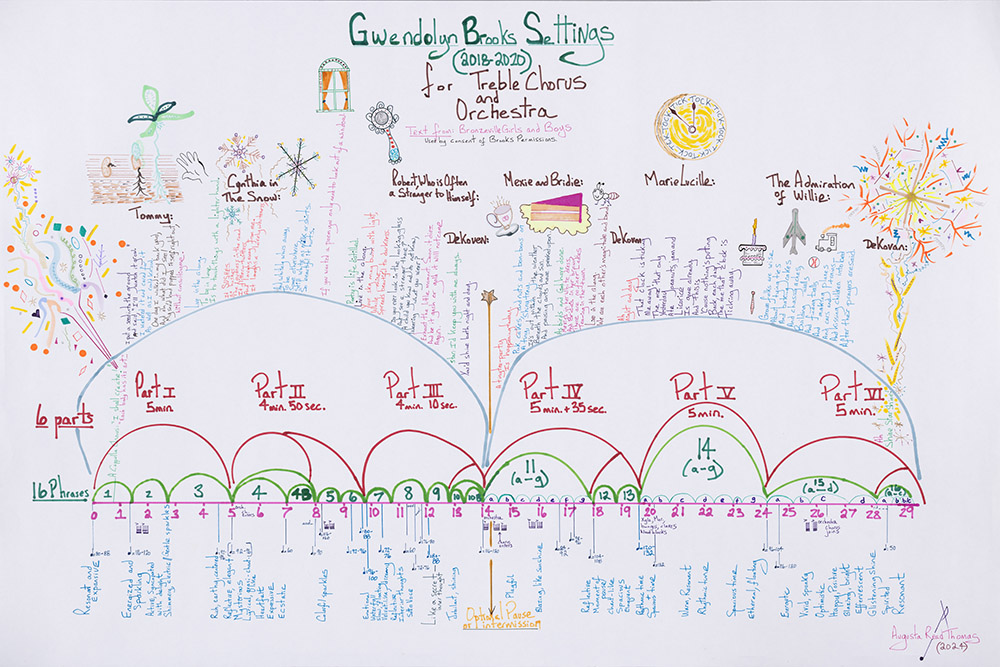
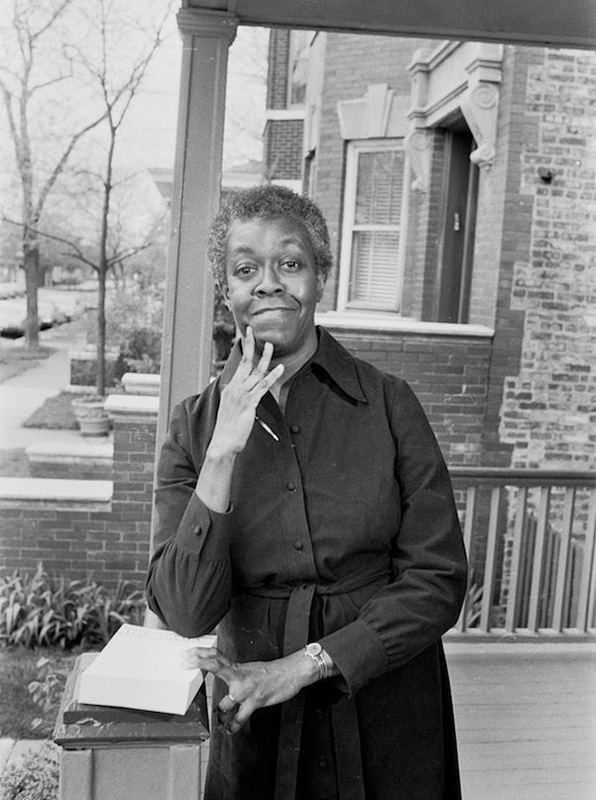
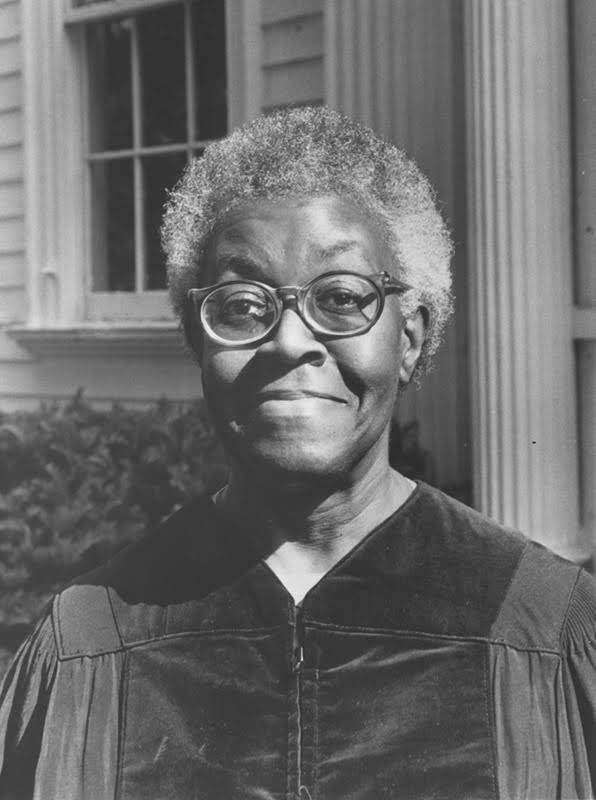
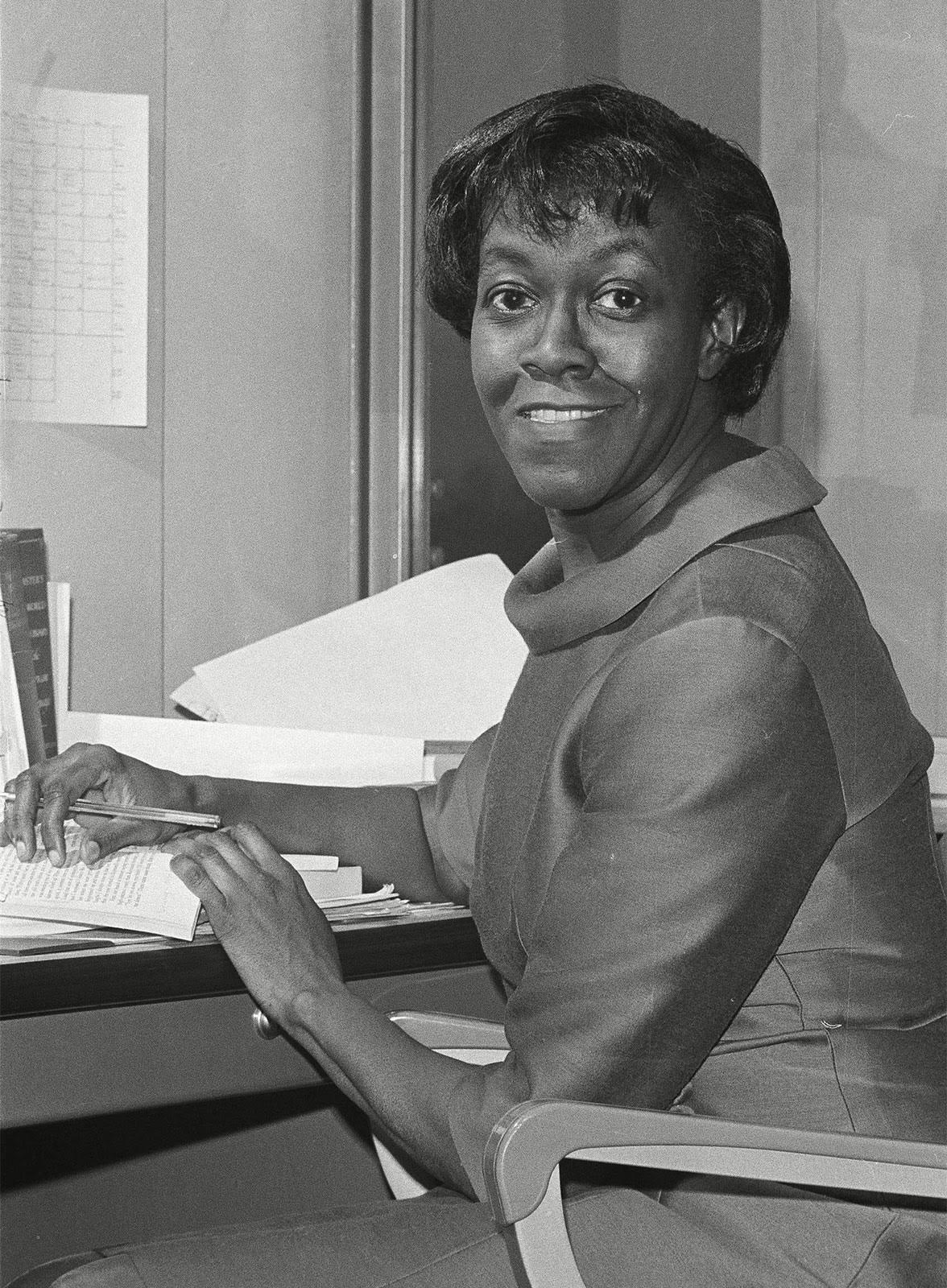

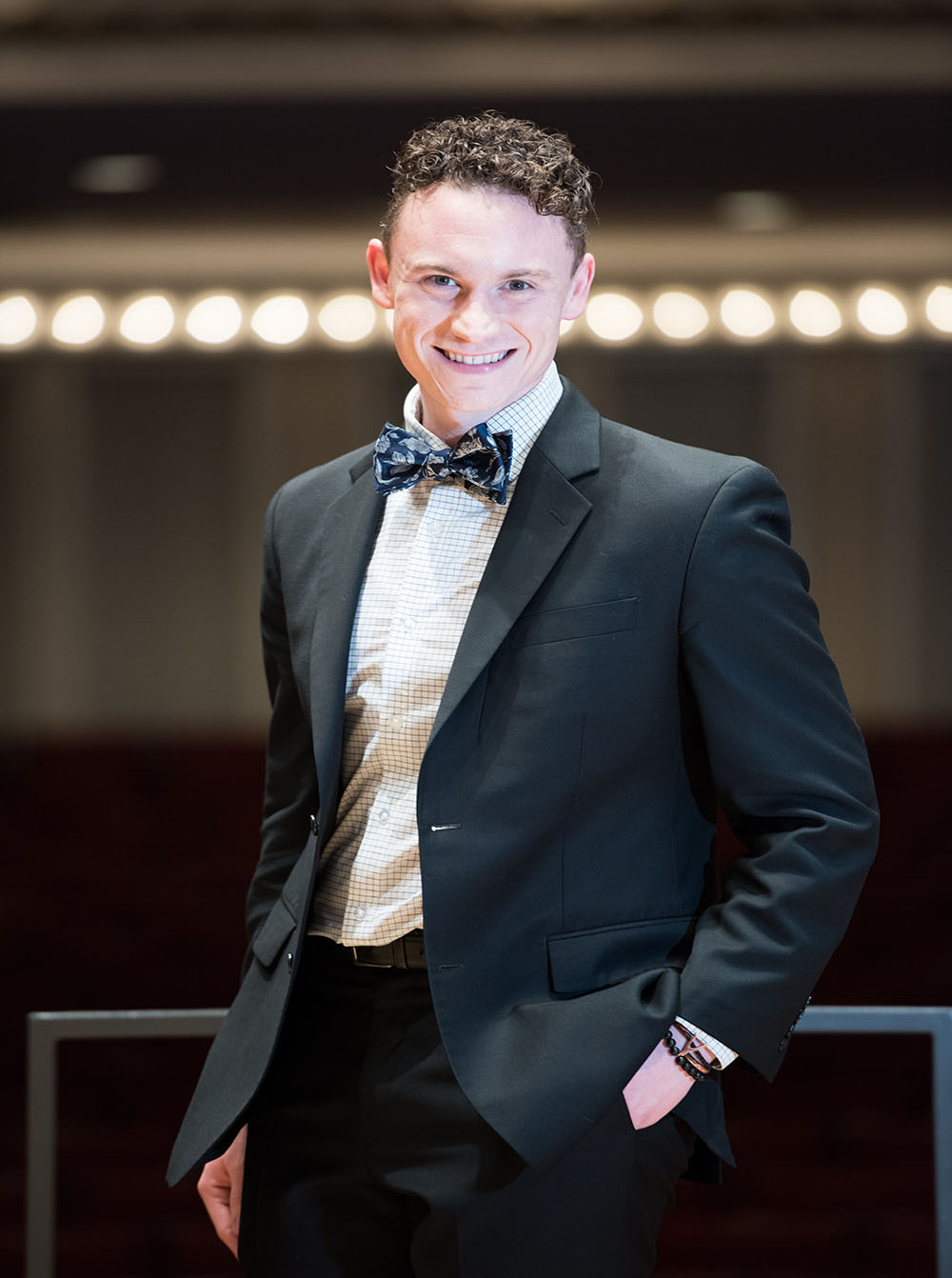

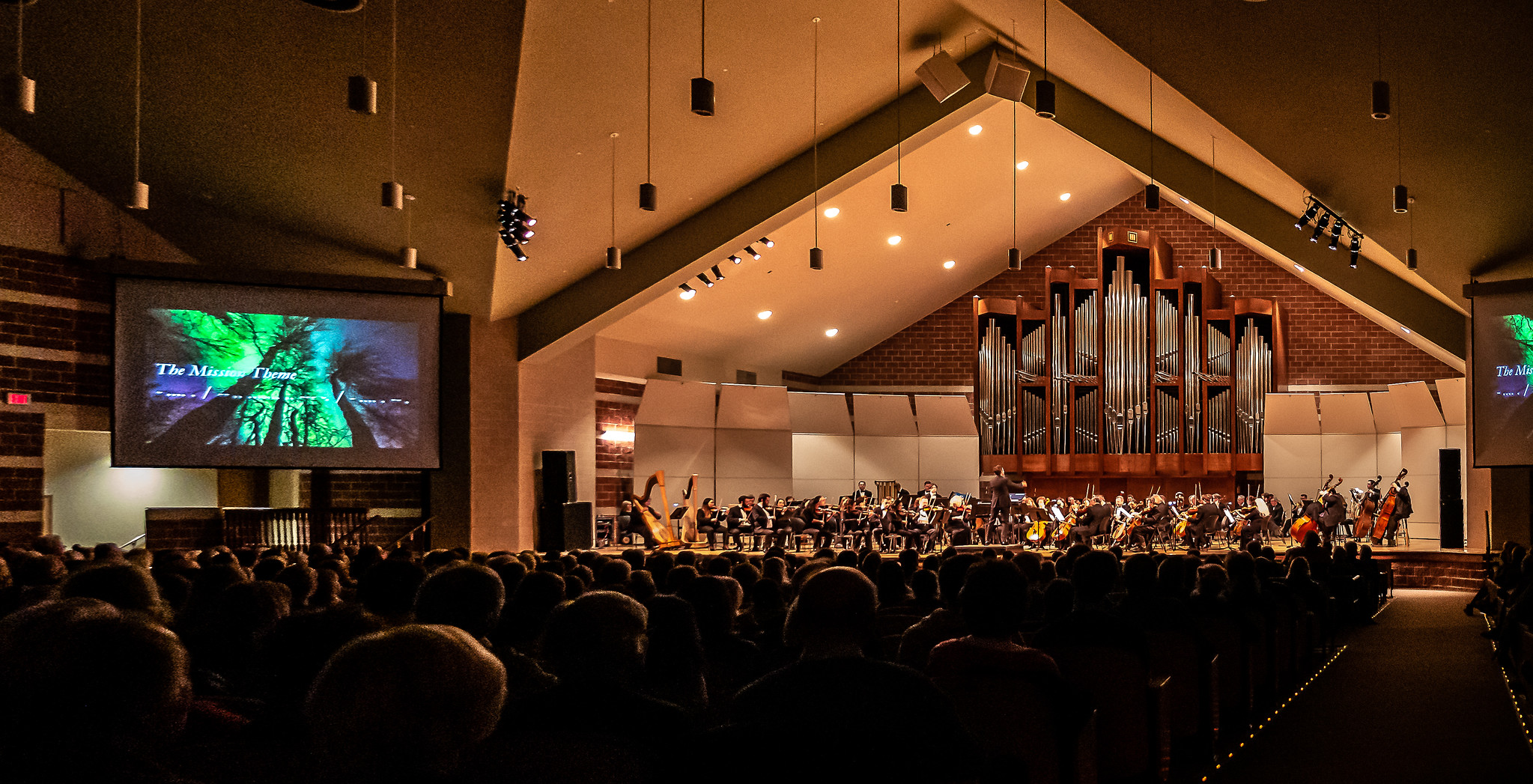
Dana Paul Perna, Sound World Sight Arts Magazine, April 1, 2024
“The highlight of this concert was Gwendolyn Brooks Settings by renowned composer Augusta Read Thomas (b. 1964) in its World Premiere performance. The title states it all, yet, while I cannot reprint the poems by Gwendolyn Brooks Ms. Thomas selected to utilize, for those among you reading this who are interested, these consisted of the following poems derived from “Bronzeville Girls and Boys” (1956, published by HarperCollins Publishers): ’Tommy’, ‘Cynthia in The Snow’, ‘Robert Who is Often a Stranger to Himself’, ‘De Koven’, ‘Mexie and Birdie’, ‘Marie Lucille’, and ‘The Admiration of Willie’.
Noted poet Gwendolyn Brooks became the first Black female to have received the Pulitzer Prize in May 1950 for “Annie Allen.” Her poetry marks a high benchmark in American Literature; her writings imbued with a sense of purpose, precision, personality, sensitivity, and humanity that remain timeless despite changing tastes, trends, and ethics (or lack there-of in terms of the latter in our present time of unconsciousness). While she was born in 1917 in Topeka, Kansas, she only lived there for the first six weeks of her life before her family moved to the Southside of Chicago where Ms. Brooks grew up, and lived for the rest of her life. As she put it: “I am an organic Chicagoan. Living there has given me a multiplicity of characters to aspire for…That’s my headquarters.” It is no wonder that she was appointed Poet Laureate of Illinois in 1968, a position she held until her death 32 years later, along with having been named the United States Poet Laureate for the 1985–86 term.
It seemed most appropriate that Ms. Brooks, a former University of Chicago faculty member (that marked her first teaching experience), was chosen to serve as the texts with which a current professor at the same institution selected to set to music in such an extended expression, equally as personally drafted as Ms. Brooks penned her poetic locutions. Both Ms. Thomas and Ms. Brooks share another honor in common: both were inducted into the American Academy of Arts and Letters.
With all that as a lead in, turning to the composition Augusta Read Thomas forged into being between 2018 to 2020, Gwendolyn Brooks Settingsis an expansive tableau in six parts for Children’s Chorus and orchestra that runs a half-hour in duration. Once her composition propels itself at its outset, it does not stop until everyone arrives at its final measure. In terms of this work, every aspect of her well crafted opus progresses constantly forward, moving from texture to texture, layering sonorities in contrast with other sonorities, thereby creating a dramatic concoction that she brilliantly formed into a unique hybrid of symphonic song-cycle, soundscape, and symphony. Many lines were derived from sustained pitches that created an ongoing weave; instruments sounding a pitch that became hocketed to the singers. Woodwinds and brass would, characteristic of the Thomas sound, punctuate her reverberant-fabric, while strings supplied supportive surfaces as the action progressed. There were moments of repose, only to resume energetically again. Her use of the chorus was integrated stylistically within the parameters she braided their participation into a quilt of sound. Of particular note were the materials she created for the percussion section, including one moment when multiple triangles were simultaneously struck fortissimo. While that tingling-tinnitus moment that was ringing in my ears has finally subsided, the memory of it has yet to fade from my memory.
Credit must be given to the outstanding musicianship of the Illinois Philharmonic Orchestra, and Maestro Kirov for pulling, and supporting all the forces together more than admirably. Without the committed work by Anima-Glen Ellyn Children’s Chorus, Chicago High School for the Arts and their directors Evan Bruno, and Charles Taylor, respectively, none of this would have rendered the desired resonance Ms. Thomas’ work – and, most especially, Ms. Brooks’ words – required. The total of its parts created a most rewarding presentation of a new composition as the appropriate conclusion for a well-attended concert built around poetry; the performers receiving a most well deserved, and enthusiastic response from the audience…..however……
….while that concludes this concert’s review, that was not the end for this new opus. The forces that presented this world premiere reassembled the following day to record Gwendolyn Brooks Settings by Augusta Read Thomas that shall appear on the Cedille Records label marking, not only the world premiere recording of her composition, but, additionally, the international debut of the Illinois Philharmonic Orchestra to appear over commercial audio platforms.
To obtain examination or performance material for this
Augusta Read Thomas work, please contact Nimbus Music Publishing.
